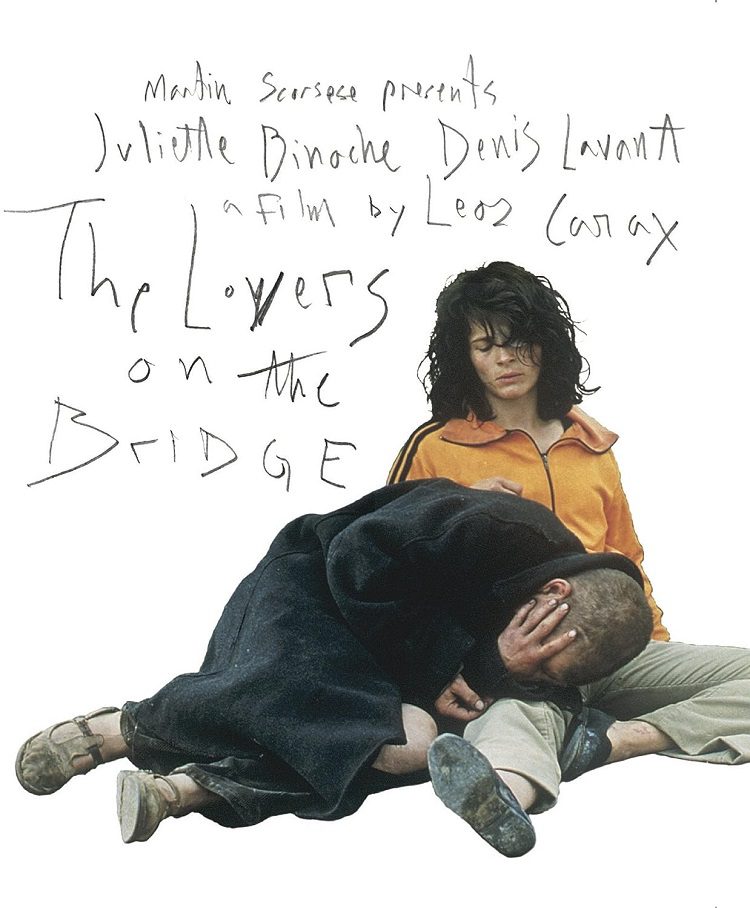
Cinematic portrayals of the homeless tend to be unrealistic if not downright demeaning. When they are not brought out for cheap scares or cheaper laughs, they are all too often seen as depraved degenerates who need a white knight to save them. Or they are unheralded geniuses in need of someone to take their hand and guide them to proper society where they will find great success. Worst of all is when they are seen as the happy poor, noble savages who really have better lives than all of us because they don’t need so much “stuff.” The Lovers on the Bridge dares show homelessness for what it is – filthy, cold, hard, and miserable.
The film begins with Alex (Denis Lavant) stumbling down a Paris street. We can’t tell if he’s drunk, or high, or mentally disturbed (we’ll find out later it was likely all three). Passersbys hardly notice him. Cars honk but barely move out of the way. Eventually, he collapses, passed out in the middle of the street. A car runs over his foot and doesn’t even bother to slow down. The cops recognize him and load him onto a bus that’s headed to a shelter. The bus is full of others just like him – drunk, angry, filthy. The stench is palpable; you can smell it coming out of your screen. The shelter treats him with some kindness but it’s a mad house. Loaded to the brim with a mass of people shouting, fighting, clawing their way to get registered. A man beats a woman bloody before being kicked out. We see them shower – naked, bruised, battered. We feel how hard life on the streets is.
The next morning Alex goes to his bridge. The Pont-Neuf is the oldest bridge in Paris. Closed down and under repair, its enclaves make the perfect respite for a homeless man from the city. He speaks to Hans (Klaus-Michael Gruber) who rules the bridge. He’s told a woman has taken his spot on the bridge, but he’ll make her go come morning. The woman is Michèle (Juliette Binoche). She comes from a more comfortable setting. Her father was an officer in the military. She lived a cozy middle-class life, but a rare eye disease is taking her sight. She wears a patch on one and the other is slowly deteriorating. We are not told why – perhaps despondency, perhaps she can’t live seeing the pity on the faces of her family – she’s been living on the street for many months.
The two fall in love and eke out an existence. He steals a fresh fish from the market, hiding it under his shirt then eating it raw. She slips drugs into unsuspecting men’s drinks then steals their wallets. It’s cold at night, even in the summer so they sleep under towels and plastic sheets. She bathes with a bottle of water while onlookers stare. It’s a hard life, but together they find some happiness.
The film does a remarkable job showing this life for what it is without flinching. It doesn’t shy away from the cause of so much homelessness either. Alex is clearly not quite right in the head. He hallucinates. He has fits of anger. One night when Michèle and Hans break into the Louvre to look at the art all night, Hans breaks into a rage, cutting his torso with a broken bottle and beating on her. Later when he finds posters hanging in the subway urging Michèle to come home because they have discovered a medical procedure that will save her sight, he burns them all down. He’s so afraid of losing her he’s willing to let her go blind. On that bridge theirs is a troubled relationship, but there is love. They do care for one another.
Mixed in with the realism are wondrous flights of fancy. When Alex and Michèle get drunk one afternoon, the camera pulls out to make them look shrunken with gigantic bottles and trash beside them. On Bastille Day, the celebratory fireworks fill the screen while they dance on the bridge. Moments later, they steal a police boat and ski down the Seine while fireworks flow all over them. When Alex burns the aforementioned posters, the cinematography turns expressionistic and we’re never quite sure if it’s actually happening or all in Alex’s mind.
The Lovers on the Bridge is one of those films that many people seem to love or hate. It’s either a one-of-a-kind masterpiece or pretentious, self-indulgent garbage. I fall somewhere in between those extremes. The way the film takes the characters’ stories seriously, painting homelessness realistically is something special. It’s moments of surrealistic expressionism are a little jarring, but also resplendent. It struggles to find the right tone. The ending loses some of the realism most of the film carried out.
Kino Lorber’s new Blu-ray of The Lovers on the Bridge looks excellent. The film itself isn’t pretty. Director Leos Carax shoots life on the streets as it really is: dirty. The characters are unwashed; the bridge is broken. This is not the glamorous Hollywood version of Paris, but a gutter’s eye view. The Blu-ray brings that all in crystal clear. I noticed no overt problems. The audio likewise is clear and nice.
Extras include an essay by Ignobly Vishnevetsky and a nice video essay by Cristina Álvarez López & Adrian Martin.